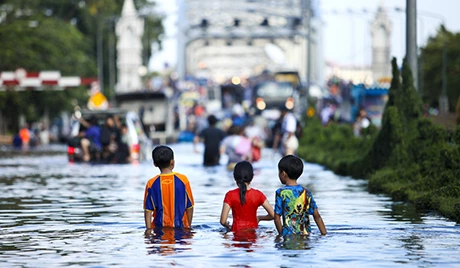Bangkok is a vibrant, cosmopolitan city, home to more than eight million people. However, a new report released by the World Bank today paints a grim picture for the Thai capital. It notes that, without adaptation, a predicted 15cm sea-level rise by the 2030s coupled with extreme rainfall events could inundate 40% of the Thai capital and almost 70% of Bangkok by the 2080s. While I certainly hope it doesn't happen, words cannot describe the impact this would have on the lives and livelihoods of people residing in this city. And Thailand isn’t the only country that could be affected by rising temperatures.
The report - Turn Down the Heat: Climate Extremes, Regional Impacts, and the Case for Resilience - was commissioned by the World Bank’s Global Expert Team on Climate Change Adaptation and prepared by a team of scientists at the Potsdam Institute for Climate Impact Research and Climate Analytics. It looks at the latest peer-reviewed science and with the aid of advanced computer simulations looks at the likely impacts of present day (0.8°C), 2°C, and 4°C warming across three regions – Sub-Saharan Africa, South Asia, and South East Asia. It focuses on the lives and livelihoods of people in the developing world by analyzing the risks to agriculture and food security in sub-Saharan Africa; the rise in sea-level, bleaching of coral reefs and their impact on coastal communities in South East Asia; and the impact of fluctuating rainfall patterns on food production in South Asia. The poor and the vulnerable are the ones that will be most affected by the impacts of climate change.
The report comes on the heels of sobering news from the International Energy Association (IEA) that global energy-related carbon dioxide (CO2) emissions rose 1.4% last year, and a recent report from the weather observatory in Hawaii that the concentration of CO2 in the atmosphere crossed the crucial 400 parts-per-million threshold, a level last seen over 800,000 years ago. Our report, combined with other scientific analysis, emphasizes the urgency to avoid the most dramatic consequences of climate change through collective action to keep warming around 2oC.
Since the launch of the first Turn Down the Heat report (in November 2012), the demand from our client countries for innovative solutions to climate change has gone up.
We are working with 130 countries on this issue and have stepped up financing for mitigation and adaptation efforts, almost doubling our lending for adaptation in FY2012. Our lending for renewable energy also hit a record high in 2012, accounting for 44% of our energy portfolio. Through the Climate Investment Funds, we are providing $7.6 billion of funding to 48 countries for transformative climate investments that support low-emission and climate-resilient development. An our recent report, Mapping Carbon Initiatives, highlights action at the domestic level to put a price on carbon. It finds that over 40 national and 20 sub-national jurisdictions as varied as Kazakhstan, China, South Africa and Australia, have either implemented or are considering carbon pricing mechanisms.
Under the leadership of President Jim Yong Kim, we are working on a climate action plan equal to the scale of the problem and bold ideas that will make the biggest difference. We work with the premise that a 4oC world can and must be avoided. We believe that the release of the Turn Down the Heat reports will further spur action on climate change from our client countries as well as some of the major developed nations, who are among the top emitters. After all, our mission is a world free of poverty and climate change is a fundamental threat to the economic well-being of a nation.
Photo: Wutthichai / Shutterstock.com



Join the Conversation